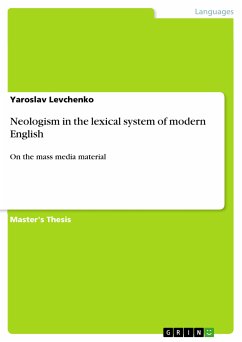Master's Thesis from the year 2010 in the subject Didactics for the subject English - Literature, Works, grade: A, Luhansk Taras Shevchenko National University, language: English, abstract: The purpose of the present work is to investigate the neologisms in the lexical system of the modern English language and reveal the major trends and tendencies taking place within the processes of the new words formation and distribution. To achieve the above mentioned purpose the following objectives are established: to study the theoretical linguistic material and the latest data on those lexicological facts and phenomena which are related to the topic of the present research; to analyze the most highly rated newspapers of Great Britain with the aim of selecting newly created and borrowed lexemes; to build up a collection of neologisms from the above mentioned mass media; to define the dominant part of speech prevailing among the collected neologisms and the distribution of other parts of speech within this framework; to define and study the types of word building inherent in the neologisms; to define and investigate the most dominant word building type and study the distribution of other ones characteristic of the collected new lexemes. In the present paper there were used such methods of scientific research as analysis and synthesis, following every chapter and part of the current work, descriptive method and the method of statistical analysis, methods of typological and lexicological analysis, comparative method, adapted NeoTrack method of neologisms detection (Appendix B), plus deductive and inductive methods of investigation and generalising the retrieved facts and data.









